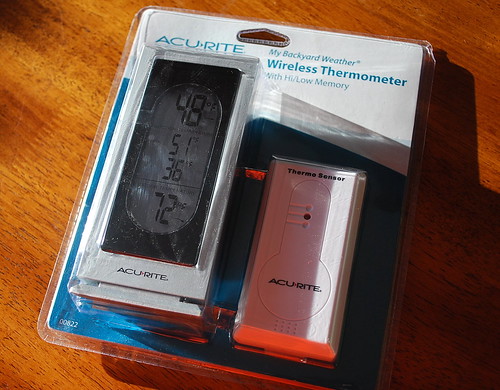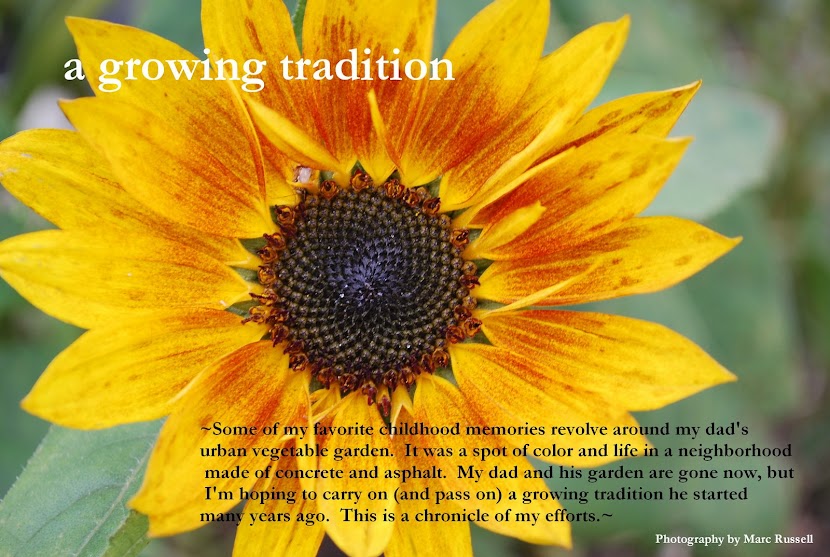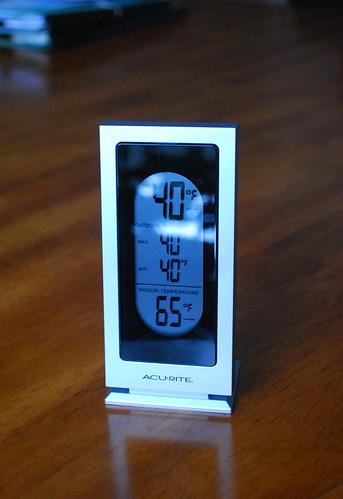
Last weekend, I picked up a digital max min thermometer from Home Depot. I'd been meaning to get one for a while now and by chance happened upon this one. It has a sensor that you leave outside to measure the outdoor temperature. It then sends this information to a small display that you keep indoors, which also measures the temperature inside your house. The screen shows the current indoor and outdoor temperatures, as well as the highest and lowest that was recorded during a given period. A button in the back allows you to reset this information.

I am hoping that this device will give me a better sense of what is happening temperature-wise inside my mini hoop houses. Specifically, I will be comparing the maximum and minimum temperatures recorded by the sensor, which is hung just beneath the inner layer of fabric, to the official high and low for my town on a given day. I will keep a daily record of this information for the rest of this winter. This information will be useful I think for a number of reasons:
- It will allow me to better predict how warm the hoop house will get on a given day and under certain conditions (cloudy, sunny, partially sunny, snowy, windy, etc.). Based on my previous findings and the current weather forecast, I'll know if say venting is necessary.
- In the fall, I'll know when to apply the inner layer of fabric once nighttime readings begin to dip below a certain temperature inside my hoop houses.
- During the winter months, I'll have a better idea of how cold hardy a certain variety is by comparing the registered low to the damage (or lack of damage) done to that crop. Also, if the weather forecast is expected to dip below that minimum temperature, I'll know to harvest that particular crop before that happens.
- Finally, once nighttime temperature readings are consistently above freezing in late winter, I will begin to sow some of my early spring crops (like lettuce, beets, peas, radishes, turnips, Asian greens and carrots) under cover. Hopefully, this will give me a jump start on the spring and summer growing seasons.
I'm very excited and encouraged by these readings. This is some early indication at least that my mini hoop houses are doing what they're supposed to be doing. Also, I'll be very anxious to see what my veggies look like tomorrow, when I finally get a chance to check up on them. On a final note, I think I'll buy another max min thermometer to keep out in the open in my backyard in order to get outdoor readings specific to my garden.







A wireless thermometer looks good. That's a scientific way to monitor your garden.
ReplyDeleteI did that last year in my hoophouse (before a Nor'easter shredded it, lol) and it was amazing to see the warm temps in there when the sun was shining! Does it have a min temp alarm? I am chuckling at the thought of you waking up to a "lettuce alarm" in the wee hours and trudging out there with blankets!
ReplyDeleteOh how convenient. I used to have a min max thermometer (it blew away years ago in some storm), but I had to actually see it to record the temps. I love yours. It will be interesting to see how much above the outside temps it is when the weather is cloudy for a while (today and tomorrow spring to mind).
ReplyDeleteI have a thermometer inside my greenhouse also, but so far, as we have had cloudy days only, the difference is small, but noticeable. I’m waiting to see if it will make a difference if its sunny day.
ReplyDeleteInteresting Thomas, I was surprised to see such a fluctuation from day to night. You should also consider adding a soil thermometer, my understanding is that the soil temp influences growth and the ability to take up nutrients and you may find it stays pretty stable. Adding water or stone inside the hoop houses will help keep your night temps a bit higher too.
ReplyDeleteI am loving your winter garden and technical recordings, way to go Thomas!
Thomas, I had my indoor/outdoor thermometer in a tomato pot yesterday, and the temperature on the sheltered south side of the house actually reached 100.4F! I sat there reading in the sun most of the afternoon, and it was usually in the high eighties. Out in the open, it was in the mid to high 60s. Now I know where I should have put my winter garden ;-)
ReplyDeleteIf you record the information as you propose - including potentially the control temps for your area - you will have a really great resource for future years. Lots of practical ways to use that info.
ReplyDeleteUSDA plant hardiness zones
ReplyDelete